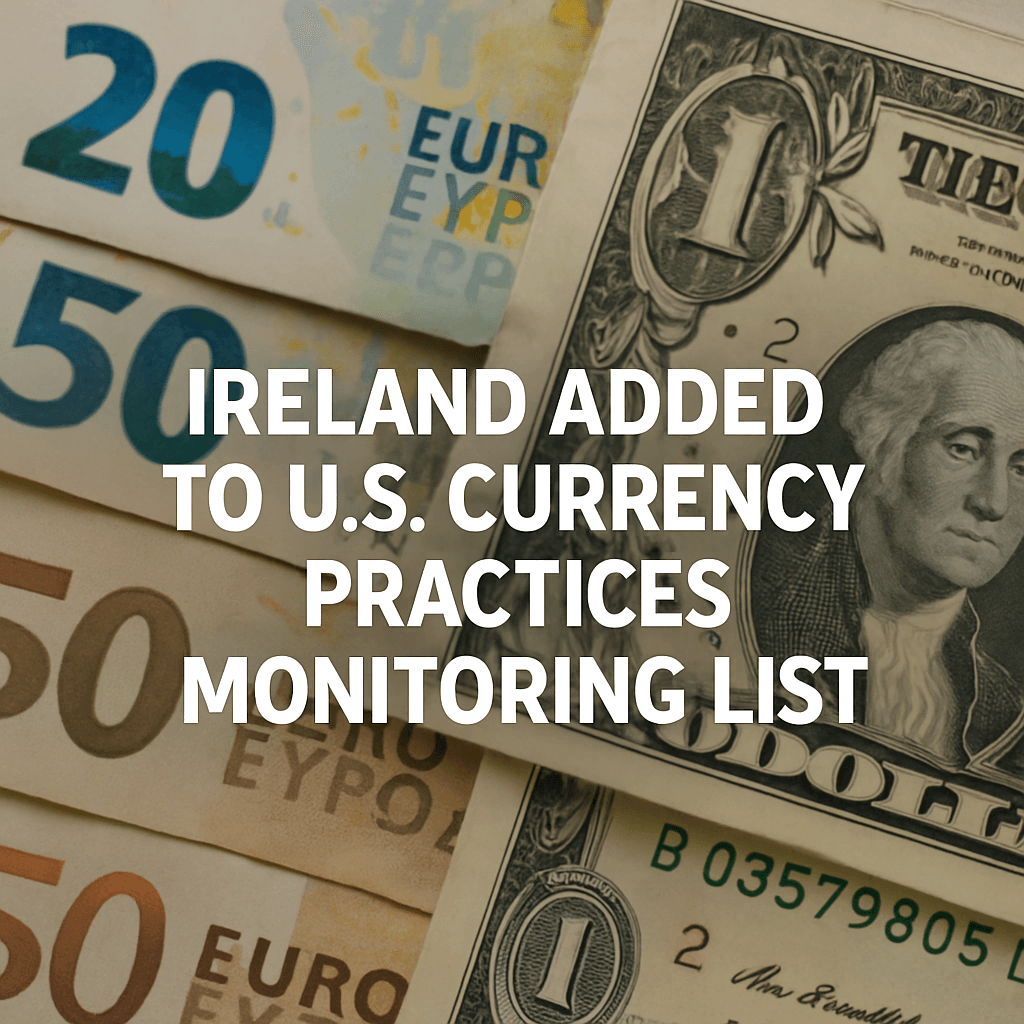Ireland Added to U.S. Currency Practices Monitoring List

The United States has recently expanded its monitoring list of countries for potential currency manipulation, adding Ireland to a roster that includes global economic heavyweights such as China and Japan. This move comes in response to a substantial and escalating trade surplus that has drawn scrutiny from the U.S. administration, particularly under President Donald Trump.
Understanding the Monitoring List
As part of the U.S. Treasury’s semiannual report on macroeconomic and foreign exchange policies of its major trading partners, Ireland and Switzerland have been included in a nine-country “Monitoring List.” This list aims to identify nations whose economic policies or currency practices warrant close examination. The other nations on this list include China, Japan, Singapore, Vietnam, Taiwan, South Korea, and Germany.
Purpose of the Monitoring List
The creation of the monitoring list began during the Barack Obama administration in 2016. It was designed to recognize and address trading partners that might have gained an unfair advantage through manipulative practices. In 2019, the U.S. officially labeled China a currency manipulator, a mostly symbolic designation that allowed then-Treasury Secretary Steve Mnuchin to appeal to the International Monetary Fund (IMF) to address alleged currency manipulation.
Recent Developments Concerning Ireland
Ireland’s inclusion on the monitoring list is particularly noteworthy given its historical context; the nation has previously appeared on this list in 2019 and 2021. Currently, Ireland boasts a record trade surplus of €50.1 billion (approximately $57.3 billion) with the United States for the previous year. This surplus can be attributed significantly to Ireland’s strong export-oriented economy, which is heavily centered on pharmaceuticals. Many pharmaceuticals exported to the U.S. are produced by U.S.-based companies with manufacturing facilities in Ireland, including major players like Eli Lilly and Pfizer.
Ireland’s Advantageous Economic Strategy
The Irish government has successfully attracted U.S. multinationals through competitive tax incentives, aiming to establish the country as a favorable destination for business investment. This strategy has led to significant investments from tech giants such as Google, Meta (formerly Facebook), and Apple, who have established their European headquarters in Ireland. The tax structure has provided these companies with a significant edge, allowing them to capitalize on the European market. However, President Trump has openly criticized this trend, raising concerns during discussions with Ireland’s Taoiseach, Micheál Martin.
Market Effects and Global Implications
According to the U.S. Treasury, recent declines in exchange rates could amplify trading balances, potentially worsening the trade deficit with Ireland, Taiwan, and South Korea. Similar dynamics have arisen with Germany, which has also been flagged for its notable trade surplus with the U.S.
- Currency Exchange Implications: The fluctuations in currency valuations can alter the competitiveness of U.S. exports compared to imports, subsequently affecting the trade deficit.
- Foreign Investment Climate: The U.S. Treasury analysis suggests that monitoring these nations’ economic practices can thwart currency strategies that may unfairly advantage their exports.
Impact of Tariffs and Trade Policy
In a broader context, the Trump administration had previously implemented a set of tariffs aimed at addressing perceived trade imbalances. Notably, a 20% collective tariff was levied against EU member states, under which Ireland benefited due to its EU membership, sparing it from more punitive trade measures. Affected parties continue to navigate ongoing tariff negotiations, including a current 90-day pause on tariffs against Chinese imports.
Conclusion
As Ireland continues to emerge as an economic nexus for American companies, its growing trade surplus with the U.S. remains a point of contention in international trade discussions. While closely monitoring currency practices is vital for maintaining fair trade relations, it remains to be seen how Ireland’s position will evolve amid ongoing U.S.-China negotiations and broader geopolitical dynamics.
“We will maintain vigilance in identifying currency manipulation and address unfair competitive advantages,” said Treasury Secretary Scott Bessent.
A representative from Ireland’s Department of Enterprise, Trade and Employment has yet to respond to inquiries regarding this latest development.
Source: fortune